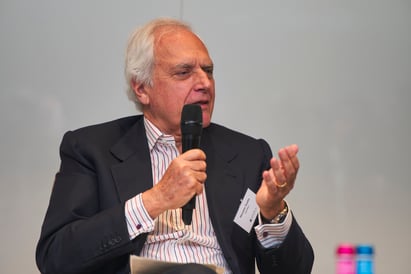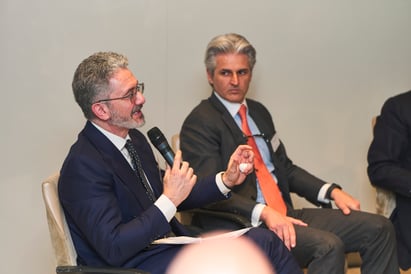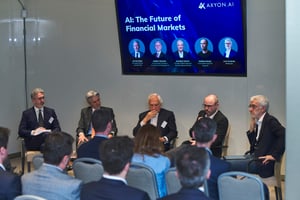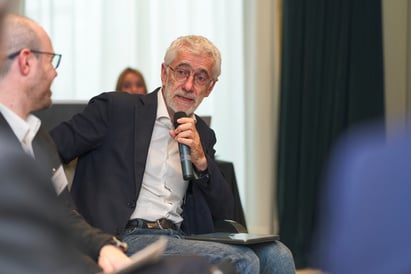AI: The Future of Financial Markets
Featured speakers:
- Massimo Tosato - Chairman of the board of M&G Group & Banca Investis S.p.A.
- Andrea Gentilini - Head of Quantitative Investments at Vontobel Asset Management
- Matteo Serio - Managing Partner at AcomeA SGR
- Daniele Grassi - Co-Founder and CEO of Axyon AI
- Moderated by Luca de Biase (Author, Journalist and Editor from the Il Sole 24 Ore)
Milan, 15 April 2024 - During our latest roundtable event, we had the opportunity to explore the profound impact of artificial intelligence in asset management, a topic of increasing relevance in the global financial landscape. Industry experts shared their insights on how AI is altering current practices and outlined the opportunities and challenges on the horizon. The debate covered various crucial aspects, from how AI transforms operations to its integration into existing business processes and the implications of global regulation and market-specific challenges.

Key Topics of Discussion
Impact and Evolution of AI in Asset Management
The roundtable extensively discussed the revolutionary potential of AI in asset management. Our speakers highlighted how AI can not only streamline daily operations but also significantly enhance analytical capabilities, paving the way for new forms of value generation. It was emphasized how AI is already positively impacting the ability to predict market trends and manage risks, thus transforming investment strategies and enabling companies to position themselves advantageously for the future.
As observed by one of our speakers - Massimo Tosato:
"The evolution we have witnessed over the last decade has predominantly centred around areas where AI can dramatically cut costs—from compliance and risk, to auditing and secondary control functions. It extends to sales operations, customer relations and the investment sphere. Here, AI not only refines the advice given to managers but also accelerates research processes, freeing analysts to pursue more senior roles, and enabling companies to position themselves advantageously for the future.”
 Massimo Tosato
Massimo Tosato
"AI offers the last chance for redemption in active management production to regain ground in performance from passive management products.”, declares Matteo Serio. He also highlights how the evolution of quantitative analysis involves the flexibility of models, the improvement of forecasting model rankings, and the optimisation of individual models, while simultaneously involving risk management. Cost savings can reach 20-30% annually.
Indeed, it is the predictive model itself that changes with AI: "To interpret the financial markets and their complexity today, one must change the approach, basing it on processes, building a model of learning and adaptation to actual performance, with a rigorous approach," complements Daniele Grassi.
 Matteo Serio
Matteo Serio
Global Implementation and Regulatory Impact
The global adoption of AI in asset management shows variable rates of adoption and techniques depending on the region, reflecting significant disparities. It emerged that in some areas, like the United States, companies have a long history of using data to enhance investment decisions, while in other regions, adoption is more recent and gradual. The discussion also addressed the emerging regulations on AI, focusing on how these could influence global competitiveness, direct innovation paths, and reshape compliance frameworks in financial services.
Integration Practices
Integrating AI into existing asset management frameworks poses significant challenges but also offers substantial rewards. The debate covered specific strategies for incorporating AI technologies into companies, detailing the necessary organizational changes and required technical skills. Practical advice was shared on how to overcome integration obstacles, with a particular emphasis on tailoring AI solutions to enhance decision-making processes and operational efficiency.
According to our co-founder and CEO Daniele Grassi:
"AI provides far more powerful tools in terms of quantitative approaches. There's a data culture today that didn't exist before. However, the complexity of financial markets requires a much more humble, agnostic, and process-driven approach to using AI. Financial markets are a learning game; what applies today may not necessarily hold tomorrow. In this context, we are trying to offer the industry a tool to free up resources." Daniele also explains that asset management players cannot shy away from implementing AI, yet they face a complex implementation process. He adds:
"First and foremost, they need to understand what AI is and then determine the strategy to adopt, including all costs involved in building an internal team from scratch. We aim to bring to the asset management world a swift solution for implementing AI in specific segments of the investment process, through specialized technology."
Historical Perspectives and Predictive Capabilities
Our speakers drew parallels between the current adoption of AI and past technological disruptions in the sector, providing context on how current adoption is similar or divergent from past trends. A significant part of the conversation revolved around AI’s role in predicting market anomalies and managing risks associated with rare but impactful events, emphasizing the need for robust predictive models that can help companies navigate effectively through uncertain financial landscapes.
As explained by Daniele Grassi, "Our solution is a rapid one through vertical technology developed over time that has allowed us to make several mistakes—it's not about having a crystal ball, but about supporting our clients' strategies based on rigour and science." Indeed, AI has the obvious advantage of being able to process and manage huge amounts of data, and to increase the chances of identifying even the weakest relationships, "the minor probabilistic hypotheses, technically known as 'black swans', broadening the prediction perspective." Even within the managed savings industry, efficiency improvements do not aim to impact people, but "the goal is to make them more productive, not to replace them."
Supported by, Andrea Gentilini, who adds :
"The human factor today becomes crucial, even for our industry: if the time for analysis and management is reduced, the resources freed up can spend more time on human relationships, explaining the predictions and algorithms to clients." Indeed, this can make a difference today, along with performance."
Andrea Gentilini
Leadership and Market-Specific Challenges
The discussion underscored the role of visionary leadership in driving AI adoption, highlighting how influential leaders shape technological integration strategies and cultural shifts within companies. Moreover, the specific challenges of the Italian market were explored, examining the local regulatory environment, market readiness, and the technological infrastructure necessary to support AI initiatives, providing insights on how tailored strategies could overcome regional barriers and harness AI's potential.
Luca de Biase, Moderator
What to expect?
The conclusions drawn from our roundtable are unequivocal: AI isn't just the future of asset management—it's very much at the heart of its present. The shift from traditional methods to a robust, data-driven, AI-powered approach is already happening. Those adept at navigating this shift are setting the pace for a new era of intelligent investing.
However, the rise of AI brings substantial ethical, regulatory, and practical challenges that must be addressed. It is essential for all industry stakeholders to employ AI with wisdom and transparency, thereby ensuring the trust of clients and the integrity of the markets remains intact.
The event was just the start of ongoing discussions about AI's growing role in asset management. Our industry is at a critical point, and those who embrace this opportunity and approach it ethically are set to transform the investment landscape.
Ultimately, combining human intelligence with AI’s powerful tools promises a future where success in asset management means more than just financial gains. It's about creating a flexible, inclusive, and effective way to manage investments. This is an exciting time to be in the investment field. Those who use AI creatively and thoughtfully will shape the success stories of the future.



